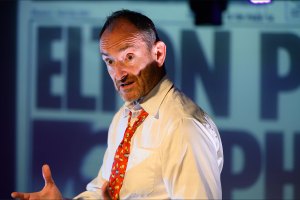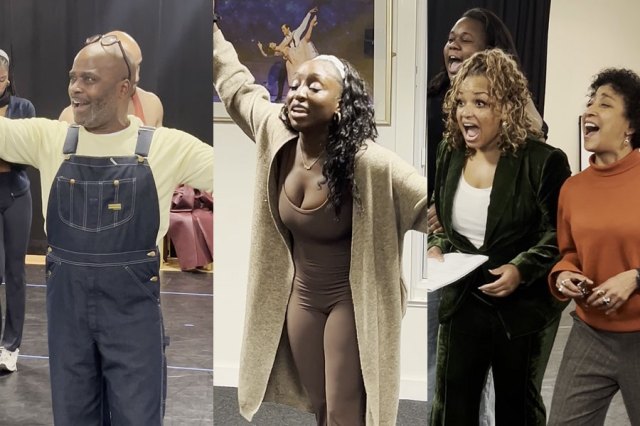Past/Present/Future for … Topol
Multi award-winning Israeli actor Topol is internationally known for playing Tevye the milkman in the original London production of Fiddler on the Roof and in the 1971 film version. Apart from Fiddler revivals around the world, he’s appeared on stage in the UK at in The Caucasian Chalk Circle, Romanoff and Juliet and Othello, and toured in Arthur Miller’s A View from the Bridge. He’s just opened in the Open Air Theatre revival of Lerner and Loewe musical Gigi, based on the 1958 MGM film. He returns to Israel next month to launch a charity holiday village for terminally ill children.
PAST: My full name is Chaim Topol, but I became known as Topol because the producer of the original London production of Fiddler on the Roof couldn’t pronounce Chaim. They couldn’t spell it correctly on the posters either so they said, “Do you mind if it’s just Topol?” I said do whatever you think is right. That was in 1967. It kind of stuck.
I slid into acting when I was a child. My parents had no connection with theatre – they emigrated to Palestine from Poland in 1933 and I was born two years later. I must have shown early signs of becoming an actor because in kindergarten the teachers placed me at the centre of school plays and I always read stories out loud to the class. When I was doing my army service, I didn’t think of acting at all – my ambition was to become a commercial artist – but an officer noticed how I boosted morale by singing and telling jokes, so I was drafted into the entertainment section.
When I returned to my kibbutz, we created a theatre company called Spring Onions and became an overnight success presenting satirical revues for three years until one of our troupe was killed in a car accident and we each went our separate ways. That’s when I moved on to form a theatre company in Haifa and began making films.
Tevye in Fiddler is one of the best parts ever written for a male actor-singer. My last production was exactly a year ago, touring Australia and New Zealand. I don’t know the exact number of times I’ve played him over the years, but my guess is that it’s about 2,700 times and that I’ve probably sung “If I Were a Rich Man” around 3,000 times, when you count concerts, radio and TV appearances.
I had no idea that Tevye would change my life. Until then, my big break was in an award-winning Israeli film called Sallah, in which I played a 50-year-old rogue. Hal Prince, Fiddler’s producer, saw it in New York, so when casting the London production he asked for that bearded old Jewish actor in Sallah. When I arrived for the audition, at just turned 30 and clean-shaven, they were all disappointed. I’d seen Zero Mostel’s Tevye on Broadway, although as a comedian he tended to play to the audience, so I didn’t want to do the same. They didn’t know that I’d already played Tevye for ten weeks in Tel Aviv, where I shared the role with my acting teacher, Mulka Rodensky. Watching Rodensky, I realised that it’s not about singing; it’s about feeling and soul. Maybe that helped me get the job.
Since then I’ve performed in Fiddler all over the world – the last time in London was in 1994, when I shared the stage with my daughter Adi, who played the daughter Chava – and the film has never dated and is always being reissued. Working in London now reminds me of recording the soundtrack at Abbey Road Studios, not all that far from Regent’s Park. I’ve seen other fine actors play Tevye, including Henry Goodman recently in London. His interpretation was remarkable, although I wasn’t too impressed with the production.
But for me, playing Tevye is more than just another musical theatre role: it’s a legacy of my family. My father used to tell me Sholem Aleichem stories and as I’ve grown older I sometimes shock myself on stage when the lines come out and I sound just like him. My grandfather was a typical Tevye, and his father was a Tevye too. They all came originally from the shtetls that you see in Fiddler. My parents also left just when anti-semitism was growing in Europe. Apparently everybody thought they were nuts to go to Palestine in 1933. But because they moved they escaped the Holocaust, the only survivors in their families.
PRESENT: There are a handful of actors who are linked with specific roles – Rex Harrison as Henry Higgins, Yul Brynner in The King and I and of course Maurice Chevalier made uncle Honore so memorable in the film of Gigi. For me, playing Honore is a contrast from the demands of Tevye. I’m usually the lead in shows, which means having to carry the production. In this musical, however, it’s the girls who are centre stage, so I just come on and have fun. Honore is also the only character who steps out of the story and talks to the audience, which is something I love doing.
Honore is an interesting character to play because he was not in the original book by Colette on which the musical was based. He was an addition, and to be honest, it does sometimes feel like that. Of course, I get to sing those great Lerner and Leowe songs “I’m Glad I’m Not Young Anymore” and “I Remember It Well”, which I perform with Millicent Martin. I worked with her twice before in London, in her own TV show in the 1960s and later when we were on the same bill at a Royal Command Performance at the London Palladium – ah yes, I remember it well!
Before Gigi opened, I was always being asked about “Thank Heaven for Little Girls” and whether you can sing those lyrics today with a twinkle in your eye. How times have changed! Back in the 1980s I recorded the song for an album and it didn’t occur to me or anyone else that its sentiment has any connotations. The way it’s done in our production makes it very innocent. Honore looks at the young girls who have grown up and become women, and he makes it very obvious that “without them what will little boys do?” You simply connect the “little boys” line with “little girls” and it solves any problem.
FUTURE: After Gigi, I’ve just confirmed that I’ll be playing Tevye again the US next year. More immediately, I’ll be continuing my work as the chairman of the Jordan River Project in Israel, which is why I have to get back as soon as we’ve sung “The Night They Invented Champagne” for the last time. JRP is a holiday village where children with incurable illnesses aged between nine and 18 from Israel and the surrounding countries can have break with their carers for free. We’ve already been sending kids to summer camp. But we’ve raised about $25 million to build this new facility in Tiberias on land high above the Sea of Galilee. We’re all so proud. There’s nothing else like it in the Middle East and it’s due to open before the end of this year.
I first became involved with charity work through the Variety Club of Great Britain, with the encouragement of Roger Moore and Sean Connery. But in 1988 Paul Newman founded his Hole in the Wall Gang Camp for terminally ill children in Connecticut and he inspired us to do the same in Israel. At JRP, the kids will get 24-hour medical supervision, and we’ve got sports and recreation facilities – and yes, even a performing arts theatre.
When I tell people it’s for Jewish and Arab kids, they often mention cultural and political differences, but when you’re dealing with children with terminal cancer or other serious conditions the priorities are completely different. There are no conflicts in hospitals. Conflict is politicians; conflict is not people. All we’re trying to do is bring a smile to their faces and give them some hope and let them just be kids. For me, this project is more important than any success I’ve had in showbusiness. I just think that as long as we can do something to help, we should.
– Topol was talking to Roger Foss
Gigi opened on 13 August 2008 (previews from 6 August) at the Open Air Theatre Regent’s Park, where it continues until 13 September 2008. Open Air artistic director Timothy Sheader’s production also features Lisa O’Hare as Gigi, Thomas Borchert as Gaston, Millicent Martin as Mamita and Linda Thorson as Aunt Alicia.












